A Path of Continuous Improvement
NGC’s Asset Integrity Management (AIM) Journey
By
Ian Walcott - Vice President, Operations
The National Gas Company of Trinidad and Tobago Limited (NGC)
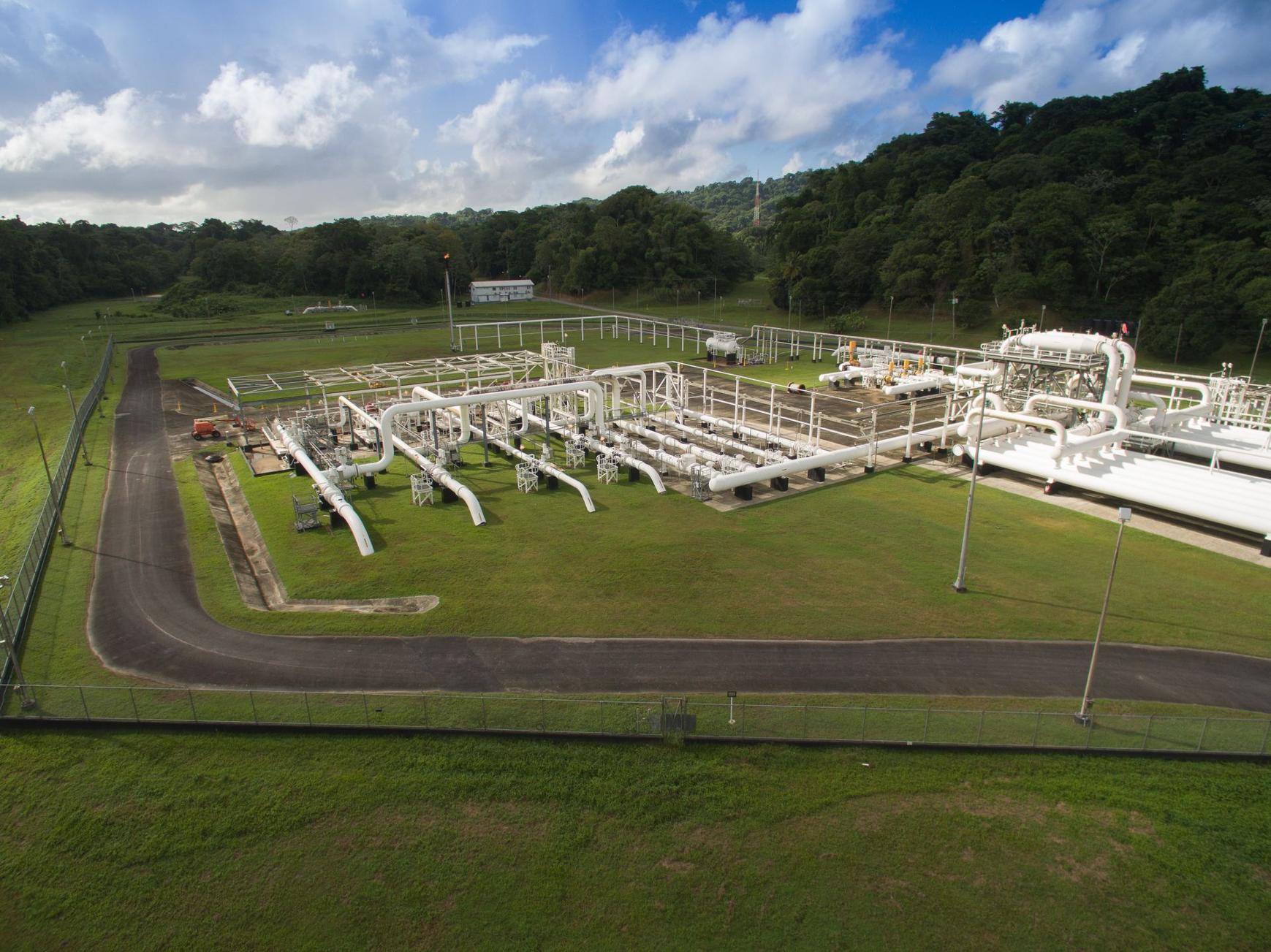
LINKAGE Q3 (2023) - LEARN, EMPOWER, SUSTAIN
O
ne September evening in 2010, a loud explosion rocked San Bruno—a residential suburb of San Francisco. A deadly fire broke out, killing eight people, injuring 58, and engulfing dozens of homes. The explosion was triggered by the rupture of defective welds on a buried, high-pressure natural gas pipeline running beneath the community. Tragedies such as this are sobering reminders of how crucial it is to monitor and maintain the structural integrity of high-risk energy assets.
With a natural gas pipeline network spanning 1,000 km, NGC manages one of Trinidad and Tobago’s most extensive and important energy infrastructure systems. Given the intrinsic dangers associated with the product running through its pipelines, NGC has always regarded asset integrity management (AIM) as business-critical. However, in recent years, the company has been taking an even more aggressive approach to AIM, intent on minimising risk in its business and across the energy sector as a whole.
NGC’s AIM journey
In 2015, the Ministry of Energy and Energy Industries engaged Det Norske Veritas (DNV) to conduct a National Facilities Integrity Audit at over 30 local companies. Systems and Equipment evaluation scores were assigned using the scale below: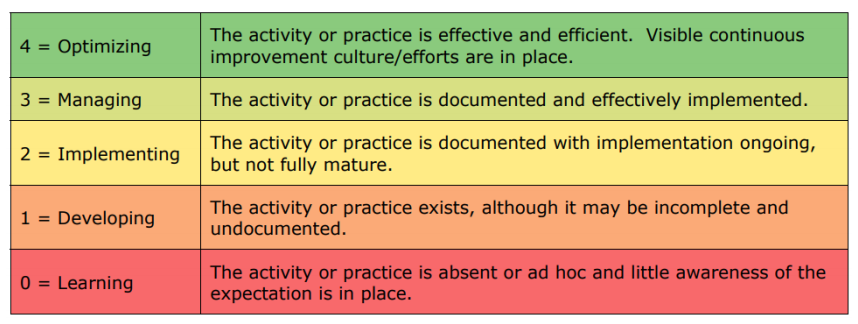
The national average for Systems was 2.02, while the Equipment score was 1.93. In comparison, NGC’s scores were 1.79 and 1.64 respectively. Having scored below the national average, NGC decided to undertake an aggressive remedial campaign on its equipment and systems to bring its AIM capability in line with best-in-class standards.
In 2019, NGC adopted a new AIM Framework based on ten functions, aligned with ISO 55000 Standards in Asset Management. This framework is built on four main pillars:
• Leadership and Governance
• Administrative Management Systems
• Technical Management Systems
• Functional Execution and Performance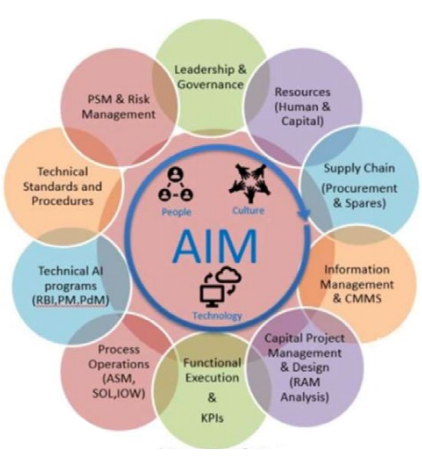
It specifies the requirements for an effective asset management system, and integrates AIM with other business areas such as human resources, governance, technical document management and supply chain management.
Areas of Improvement
Maintenance Automation
Significant strides have been made is with the computerisation of planning and scheduling of preventative maintenance works of NGC’s manned facilities, which also generated valuable data to streamline maintenance performance in the future.
Mitigating Risk
NGC began transitioning from a traditional time-based to a risk-based asset inspection programme, which focuses on reducing risk by channelling resources towards inspecting assets in areas that are high risk and more prone to failure. NGC has also adopted the Centre for Chemical Process Safety Risk-Based Process Safety guidelines, reinforcing PSM and occupational safety continuously through communication, training, and system improvements: 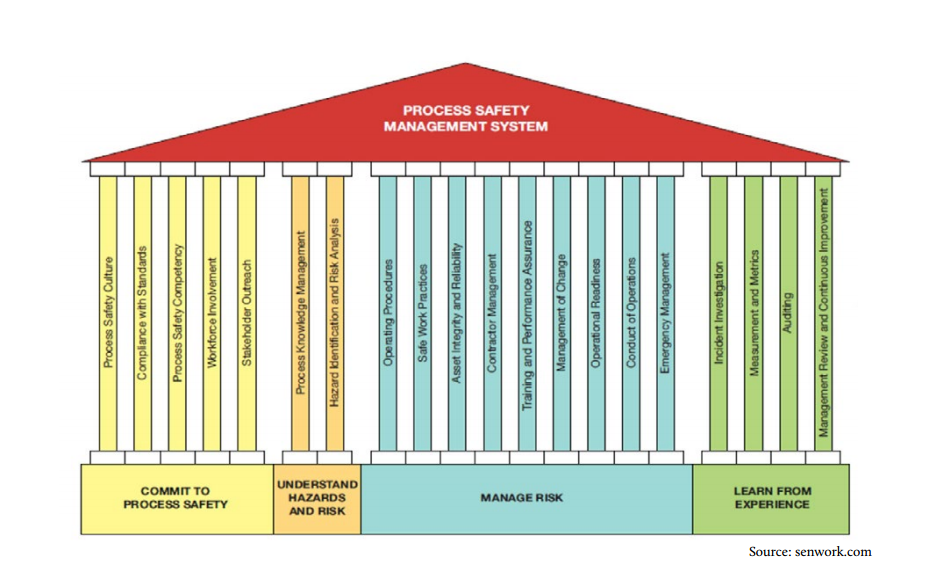
Technology
A specialist drone, capable of carrying payloads such as infra-red cameras and gas detection sensors now aids NGC in its asset integrity efforts. Tablets and digital forms are now being used to capture information and prepare and submit reports in real time. NGC is also testing Extended Reality applications for scenario modelling, emergency response training, and even virtual tours for visitors, which would also reduce the exposure of NGC’s infrastructure to the risk of third-party interference.
In 2022, the Synergi Pipeline Software, which NGC has been using since 2012, was upgraded to the latest version of the DNV Pipeline Integrity Management Software. The latest version of the software offers a host of advantages in classifying risk. It also provides geotechnical and statistical population data from NGC’s GIS database to inform NGC’s preparedness.
Focus on Methane
NGC has made methane mitigation a priority. This is intimately tied to AIM, since compromised assets can leak gas—and by extension methane—into the atmosphere. The company has an active leak detection and repair programme, deploying specialised equipment for emissions detection such as infrared cameras and satellite imaging supported by Dutch company Orbital Eye.
Accountability
AIM has been pegged to NGC’s corporate scorecard as a key performance indicator. An AIM Steering Committee was formed to share best practices, methodologies and technologies. In 2022, NGC submitted its first report to the the voluntary Oil and Gas Methane Partnership, which commits members to report on their methane emissions, and earned gold standard status for the targets with respect to curbing emissions in the coming years. Membership and learnings from other companies around the world will help NGC improve its emissions measurement, management and reporting.
Building stronger
Since the 2015 DNV audit, NGC has periodically re-assessed its AIM performance through two subsequent external audits in 2017 and 2022. According to the results of the latest audit, the company’s AIM scores have markedly improved. Its Systems score is now 2.8 (2015: 1.79) and its Equipment score is 2.6 (2015: 1.64). This means NGC has moved from the ‘Developing’ (orange) to ‘Implementing’ (yellow) category in the DNV scoring rubric. While there is still work to be done, the company is reassuringly on the progressive path.
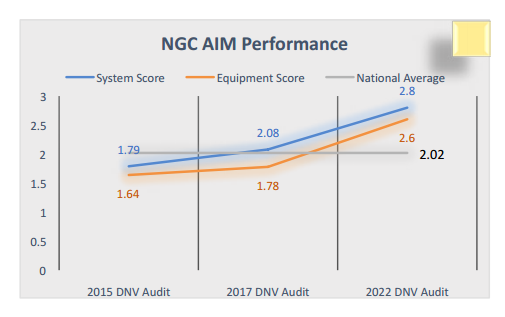
Importantly, NGC is not just keeping its learnings to itself. The 2015 DNV audit revealed deficiencies in asset integrity management across the energy sector, which is a national concern. NGC has therefore shared lessons learnt and even its technology with the industry as an active member of the Point Lisas Energy Association’s Asset Integrity Management and Technical Sub-Committee. NGC also hosted an event in April 2023 to share its AIM journey and learnings with representatives from energy companies and agencies such as the Water and Sewerage Authority, which also manages ageing pipeline systems.
.
ABOUT THE AUTHOR

Ian Walcott is the Vice President, Operations at The National Gas Company of Trinidad and Tobago Limited (NGC)